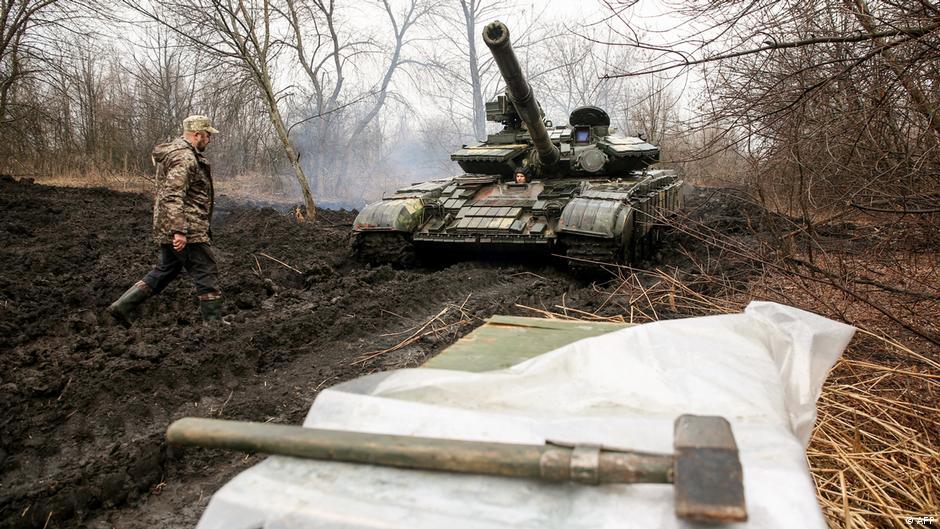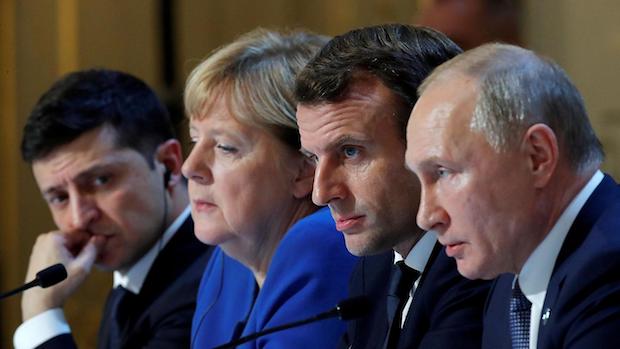Evangelicals in Ukraine and Russia mobilise for peace after weeks of much tension
The Russian Evangelical Alliance calls to “restore the peaceful relations between the peoples of both countries”. Churches in Ukraine encouraged to “pray and fast for the peace in our land”.
Protestante Digital · KIEV · 23 APRIL 2021 · 12:09 CET

“Those who organise any provocations threatening our core security interests will regret their deeds more than they regretted anything for a long time” said Russian President Vladimir Putin this week as he gave his state-of-the-nation address, and added: “Russia’s response will be asymmetrical, quick and tough”.
These words come after a renewed increase of tensions with the neighbouring Ukraine, as Russia mobilised around 100,000 troops to practice war games in Crimea and other border territories. The expulsion of Russian, Czech and Ukrainian diplomats in recent days has also added to the tension.
“The risk of further escalation is evident. A spark can jump here or there”, the Foreign Affairs leader of the European Union, Josep Borrell, warned.
Moreover, over one thousand protestors were detained in the non-authorised protests in Moscow and other Russian cities in support of opposition leader Alexei Navalny, imprisoned since the beginning of February and on a hunger strike that has severely affected his health.
In this difficult context, the orders of the Russian Defence Ministry to pull back troops in the last hours have been received with relief, as “it proportionally reduces tension”, the Ukrainian President Volodymyr Zelensky said on Twitter has he thanked “international partners for their support”.
The Director of the Global Peace and Reconciliation Network of the World Evangelical Alliance, Johannes Reimer, is convinced that at this point, “Russia and the EU must start an honest conversation addressing issues of bilateral concern”.
The idea of war does not make an impression on evangelicals
For evangelical Christians on both sides of the border, peace remains the priority.
“Personally, I have a negative attitude to this conflict”, the Secretary General of the Russian Evangelical Alliance, Vitaly Vlasenko, told Spanish news website Protestante Digital, although he makes clear that he “cannot speak for all evangelical Christians of Russia, since each person has his own free opinion on this and other issues”.
“I very much want friendly relations between the peoples of our countries to be restored”, Vlasenko says, because the aim is to “live in peace and harmony”. “In my opinion, we must do everything possible to reduce the tension of the conflicting parties, with people’s and church diplomacy. And, if possible, work out a new plan for a peaceful settlement”.
The Russian EA representative stresses that they “stand for the peaceful resolution of all possible conflicts”. “We understand that the military method of resolving any disagreements brings pain and suffering to the people involved in hostilities. We hope and intend to make efforts for the diplomatic settlement of any mutual claims among the fraternal peoples. I pray every day and urge all Christians in Russia and Ukraine to do this for the pacification of the situation, and I pray for the wisdom of politicians participating in the negotiation process from both sides”, says Vlasenko.
From Ukraine, Ruslan Kukharchuk, a journalist founder of the Novomedia Association and an evangelical Christian, speaks of the “intensification of Russian military presence”, which would have caused the death of at least ten Ukrainian soldiers in April. He thinks Putin is trying to “to destabilise the situation in Ukraine” and to “remind about Russia’s leadership in the region”. But despite the situation, “during the last two weeks almost all Ukrainian evangelicals have issued a public call to pray and fast for peace in our land. Prayer events really intensified in April”.

The Ukranian President (left) has offered the Russian President (right) a meeting in the Donbas region. / Photo via Twitter @political_room Reimer, serving the World Evangelical Alliance and living in Germany, underlines that the only viable socio-political solution for the European Union is the restoration of peace with the Eurasian giant. “The EU is not prepared for military action. Our weakness comes from the very political construct which does seldom allow joint moves. A union which is not able to sort out the refugee issue, will obviously not know how to confront a well-trained and experienced Russian Army of 150.000 soldiers”.
Reimer adds: “Ukraine is a border state, and it is a canonical territory of the Orthodox Church. Russia will never give up on some kind of control. The EU tries to secure their Eastern borders by supporting a border-state”.
How are the relationships between Ukrainian and Russian evangelicals?
Despite the strong commitment to peace, Christians on both sides admit that the relationships between evangelical churches have been affected by the ongoing tensions.
“Ukrainian evangelicals do have and keep individual relationships with Russian brothers and sisters. But public participation of Russian pastors and preachers in Ukraine happens very rarely now. The same would be the case with Ukrainian church guests in Russia”, observes Kukharchuk.
From Russia, the Secretary General of the Evangelical Alliance sees that although “conflicts are not always unequivocally evil, unfortunately, we were not quite ready for what happened”. The aim should be to “look at this challenge as a test that we can overcome by seeking the Lord and showing love, mercy and compassion for one another”, he says.
“We will continue to make attempts to establish horizontal ties between the peoples of Russia and Ukraine, between Christian churches and missions. God has no nationality, we are all citizens of the Kingdom of Heaven. We should remember this when we are in dialogue”.
The pandemic, another ongoing conflict
The latest tensions between Russia and Ukraine have been the first since the Covid-19 arrived in Europe. The impact of the pandemic in the population (over 42,000 deaths in Ukraine and at least 105,000 in Russia) and the economic crisis (according to the IMF, Ukraine had a negative growth in 2020 of a -4.2% and Russia -3.1%), add pressure to the conflict.
Speaking about the restrictions for places of worship, Vlasenko states that Russian “churches have resumed their work and evangelical Christians take part in meetings and other events”, always following protection measures such as “using hygiene products”.
In Ukraine, “churches are allowed to have services” but the country continues in a semi-lockdown, points out Kukharchuk. Christians communities “which use rented venues are having some difficulties, in some cities using public spaces is banned”.
In what both countries are in a similar situation is in the vaccination process. Although, according to the platform Our World in Data, Russia has already given the vaccine to 7% of its population and Ukraine only to 1%, both Vlasenko and Kukharchuk agree that there is a diversity of opinions among evangelicals regarding the available vaccines.
“Every believer should make personal individual decision. Churches do not call to vaccinate or not to vaccinate. They call individuals to study and to decide individually”, says the Ukrainian journalist.
In Russia, says Vlasenko, “many pastors of local churches recommend that their parishioners be vaccinated”, but he notes that “another part of the pastors treat vaccinations with some fear”.
Published in: Evangelical Focus - europe - Evangelicals in Ukraine and Russia mobilise for peace after weeks of much tension
